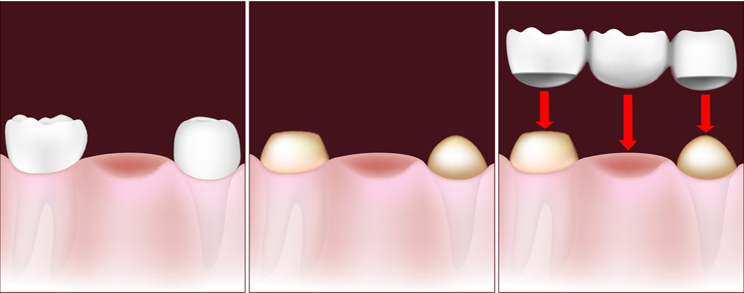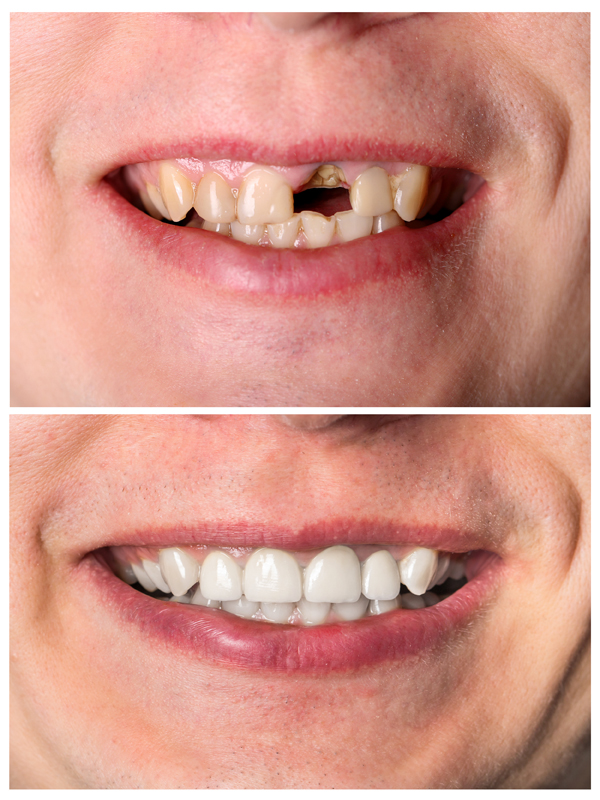A long-lasting solution to replacing lost teeth, dental bridges from Gainesville
Dental Arts is an excellent restorative dental option. Dental bridges are made of
three or more porcelain crowns fused together to replace missing teeth. Unlike traditional
dentures, bridges are permanent and cannot be removed.

If you are missing one or more of your teeth, our doctors in Gainesville Dental
Arts may be able to restore your smile using a dental bridge. Bridges are composed
of a replacement tooth or teeth supported on either side by a porcelain crown. These
crowns are connected to the teeth adjacent to a gap, creating a strong and natural
looking replacement. Non-removable bridges provide a sturdier, more stable solution
to missing teeth than removable dentures, giving our patients the feeling of having
permanent teeth once again.
A bridge is fabricated by reducing the teeth on either side of the missing tooth
or teeth by a preparation pattern determined by the location of the teeth and by
the material from which the bridge is fabricated.
A bridge is made up of two crowns one on each tooth on either side of the gap --
these two anchoring teeth are called abutment teeth -- or a false tooth/teeth in
between. These false teeth are called pontics and can be made from gold, alloys,
porcelain or a combination of these materials. Dental bridges are supported by either
natural teeth or dental implants.
No matter what type of bridge a patient receives, the restoration will have significant
aesthetic and practical benefits. The new teeth will restore dental functionality
and oral health. Additionally, thanks to new dental technology and aesthetic advances,
today’s dental bridges are virtually indistinguishable from natural teeth.
The Dental Bridge Procedure
- First, you are given a local anesthetic to eliminate any pain.
The teeth on either side of the missing space are then prepared for crown fitting.
- An impression of your teeth is made, so that your dental bridge
can be accurately molded to fit perfectly.
- You are fitted with a temporary bridge to protect your gums
and teeth while the permanent one is being fabricated in the dental lab.
- In your next appointment, the temporary bridge is removed and
your permanent bridge is applied. Once it’s correctly fitted, it is permanently
cemented in place.
Benefits of Dental Bridges
- Restore your smile
- Restore your ability to properly chew and speak
- Maintain the shape of your face
- Distribute the forces in your bite properly by replacing missing teeth
- Prevent remaining teeth from drifting out of position
- Offer a natural, healthy appearance
- Can be applied in only two office visits
- Are more permanent and secure than traditional dentures, with no sliding or moving
- Help regain natural speaking and chewing ability
- Prevent remaining teeth from drifting out of position
- Colored to perfectly match the shade of your other teeth
- Shifting of the teeth that can lead to bite problems (occlusion) and/or jaw problems
and resultant periodontal disease
- Bridges safeguard the integrity of existing teeth and help maintain a healthy, vibrant
smile

How Do I Care for My Bridges?
It is important to keep your remaining teeth healthy and strong as the success of
the bridge (depending on the type selected) depends on the solid foundation offered
by the surrounding teeth. Brushing twice a day and flossing daily helps prevent
tooth decay and gum disease that can lead to tooth loss. Your dentist or dental
hygienist can demonstrate how to properly brush and floss your teeth. Keeping a
regular cleaning schedule will help diagnose problems at an early stage when treatment
has a better prognosis. Selecting a balanced diet for proper nutrition is also important.